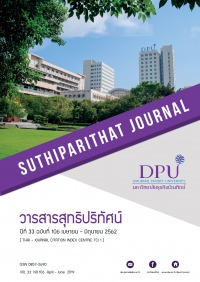การเปลี่ยนผ่านสู่ดิจิทัลและความก้าวหน้าของฟินเทคไทย
คำสำคัญ:
ฟินเทค, กลุ่มสถาบันการเงิน, กลุ่มที่ไม่ใช่สถาบันการเงิน, ปัจจัยที่มีผลต่อทิศทางธุรกิจฟินเทคที่ควรจับตามองบทคัดย่อ
พัฒนาการของธุรกิจเทคโนโลยีทางการเงินหรือฟินเทค (FinTech) ขึ้นอยู่กับรากฐานที่สำคัญคือ การวางระบบนิเวศทางธุรกิจ (Ecosystem) ที่เอื้อต่อการแข่งขันและการเจริญเติบโต โดยผ่านกระบวนการเปลี่ยนผ่านสู่ดิจิทัล (Digital transformation) ทั้งของภาครัฐและเอกชนในประเทศ บทความนี้จัดทำขึ้นเพื่อติดตามการพัฒนาระบบนิเวศทางธุรกิจฟินเทค และความก้าวหน้าของธุรกิจฟินเทคภายในประเทศ โดยแบ่งการมองออกเป็นสองกลุ่มธุรกิจได้แก่ กลุ่มสถาบันการเงินและกลุ่มที่ไม่ใช่สถาบันการเงิน นอกจากนี้ ยังรวบรวมปัจจัยที่มีผลต่อทิศทางธุรกิจฟินเทคที่ควรจับตามองในอนาคต แม้ระยะที่ผ่านมามีเหตุการณ์หลายอย่างที่ส่งผลลบต่อธุรกิจฟินเทคเกิดขึ้นอย่างต่อเนื่องทั่วโลก แต่ประเทศไทยก็มีความคืบหน้าในการส่งเสริมธุรกิจฟินเทคระดับหนึ่ง โดยเฉพาะอย่างยิ่งความชัดเจนของกฎหมายที่ออกมาหลายฉบับ ที่จะทำให้ไทยสามารถก้าวขึ้นเป็นผู้นำด้านฟินเทคในภูมิภาคนี้ได้ในอนาคต
เอกสารอ้างอิง
พรชัย ชุนหจินดา. (2560). ฟินเทค (FinTech) เพื่อก้าวสู่การเป็นประเทศไทย 4.0. วารสารอิเล็กทรอนิกส์การเรียนรู้ทางไกลเชิงนวัตกรรม (e-JODIL), 7(1), 1–23. สืบค้นจาก http://ejodil.stou.ac.th/filejodil/14_1_592.pdf
พรชัย ชุนหจินดา. (2561). บทเรียนจากทศวรรษแรกของคริปโทเคอร์เรนซี. วารสารอิเล็กทรอนิกส์การเรียนรู้ทางไกลเชิงนวัตกรรม (e-JODIL), 8(1), 1–28. สืบค้นจาก http://e-jodil.stou.ac.th/filejodil/17_1_641.pdf
ฝ่ายการชำระเงินและพันธบัตร. (2561). ความสำเร็จของโครงการ DLT scripless bond ในการใช้เทคโนโลยีบล็อกเชน เพื่อยกระดับโครงสร้างพื้นฐานตลาดตราสารหนี้ของประเทศ. ธนาคารแห่งประเทศไทย. สืบค้นจาก https://www.bot.or.th/Thai/PressandSpeeches/Press/News2561/n6961t.pdf
ฝ่ายกำกับธุรกิจสถาบันการเงิน. (2561). การอนุญาตให้ธนาคารพาณิชย์และบริษัทในกลุ่มธุรกิจของธนาคารพาณิชย์ ให้บริการแพลตฟอร์มอิเล็กทรอนิกส์ (e-Marketplace Platform). ธนาคารแห่งประเทศไทย. สืบค้นจาก https://www.bot.or.th/Thai/PressandSpeeches/Press/News2561/n0761t.pdf
ฝ่ายตลาดการเงิน สายตลาดการเงิน. (2561). ความร่วมมือในโครงการอินทนนท์ (Wholesale central bank digital currency). ธนาคารแห่งประเทศไทย. สืบค้นจาก https://www.bot.or.th/Thai/PressandSpeeches/Press/News2561/n5461t.pdf
ฝ่ายเทคโนโลยีทางการเงิน. (2561). กรอบการกำกับดูแล Peer-to-peer lending platform. ธนาคารแห่งประเทศไทย. สืบค้นจาก https://www.bot.or.th/Thai/PressandSpeeches/Press/News2561/n6361t.pdf
ฝ่ายเทคโนโลยีทางการเงิน. (2562). แนวทางการเข้าร่วมทดสอบและพัฒนานวัตกรรมที่นำเทคโนโลยีใหม่มาสนับสนุนการให้บริการทางการเงิน (Regulatory sandbox). ธนาคารแห่งประเทศไทย. สืบค้นจาก https://www.bot.or.th/Thai/FIPCS/Documents/FPG/2562/ThaiPDF/25620036.pdf
พระราชกำหนดการประกอบธุรกิจสินทรัพย์ดิจิทัลพุทธศักราช 2561. (2561, 13 พฤษภาคม). ราชกิจจานุเบกษา. เล่ม 135 ตอนที่ 33 ก. หน้า 43-70. สืบค้นจาก http://www.ratchakitcha.soc.go.th/DATA/PDF/2561/A/033/43.PDF
พระราชกำหนดแก้ไขเพิ่มเติมประมวลรัษฎากร (ฉบับที่ 19) พุทธศักราช 2561 (การจัดเก็บภาษีจากทรัพย์สินดิจิทัล). (2561, 13 พฤษภาคม). ราชกิจจานุเบกษา. เล่ม 135 ตอนที่ 33 ก. หน้า 71-73. สืบค้นจาก http://www.ratchakitcha.soc.go.th/DATA/PDF/2561/A/033/71.PDF
พระราชบัญญัติการรักษาความมั่นคงปลอดภัยไซเบอร์. (2562). ศูนย์ให้บริการความรู้กฎหมายเทคโนโลยีสารสนเทศและการสื่อสาร สำนักงานพัฒนาธุรกรรมทางอิเล็กทรอนิกส์. สืบค้นจาก https://ictlawcenter.etda.or.th/de_laws/detail/de-laws-cyber-security-protection-act
พระราชบัญญัติคุ้มครองข้อมูลส่วนบุคคล. (2562). ศูนย์ให้บริการความรู้กฎหมายเทคโนโลยีสารสนเทศและการสื่อสาร สำนักงานพัฒนาธุรกรรมทางอิเล็กทรอนิกส์. สืบค้นจาก https://ictlawcenter.etda.or.th/de_laws/detail/de-laws-data-privacy-act
(ร่าง) พระราชบัญญัติการพิสูจน์และยืนยันตัวตนทางดิจิทัล. (2562). สำนักงานเศรษฐกิจการคลัง กระทรวงการคลัง. สืบค้นจาก http://www.fpo.go.th/main/Draft-Law/Draft-law-is-in-between-Publichearing/8978.aspx?fbclid=IwAR2LzvHJVXKQBVSKxsJMzxBUW8lsaVbBrlTnCmRtuMSvSMLKuyk8iZnMLwg
(ร่าง) พระราชบัญญัติส่งเสริมการประกอบธุรกิจด้วยเทคโนโลยีทางการเงิน. (2561). สภานิติบัญญัติแห่งชาติ. สืบค้นจาก https://www.senate.go.th/view/1/Listening_to_the_Draft_Bill/EN-US
สำนักข่าวอีไฟแนนซ์ไทย. (2561, มีนาคม). แบงก์เปิดศึกฟรีค่าธรรมเนียม กูรูมองฉุดรายได้ไม่มาก. สืบค้น 10 มิถุนายน 2562, สืบค้นจาก https://www.efinancethai.com/HotNewshotnewsmain.aspx?name=RWpKTm9QYkFHekFCOXBlUlRHSU14QT09
Acs, Z. J., & Sussan, F. (2017). The digital entrepreneurial ecosystem. Working paper. Retrieved from https://papers.ssrn.com/sol3/papers.cfm?abstract_id=2918535
Bank of England. (2019, June 10). EU withdrawal. Retrieved from https://www.bankofengland.co.uk/eu-withdrawal
Capgemini. (2018). World FinTech report 2018. Retrieved from https://www.capgemini.com/wpcontent/uploads/2018/02/world-Fintech-report-wftr-2018.pdf
Chen, L. (2016). From Fintech to Finlife: The case of FinTech development in China. China Economic Journal, 9(3), 225-239. Retrieved from https://doi.org/10.1080/17538963.2016.1215057
Chishti, S. (2016). How peer to peer lending and crowdfunding drive the FinTech revolution in the UK. Banking Beyond Banks and Money, 55-68. Retrieved from https://link.springer.com/chapter/10.1007/978-3-319-42448-4_4
Congressional Budget Office. (2019). The budget and economic outlook: 2019 to 2029. Congress of the United States. Retrieved from https://www.cbo.gov/system/files?file=2019-01/54918-Outlook.pdf
Devarajan, S., Go, D. S., Lakatos, C., Robinson, S., & Thierfelder, K. (2018). Traders’ dilemma: Developing countries’ response to trade disputes. World Bank’s Policy Research Working Paper. Retrieved from http://documents.worldbank.org/curated/en/115171541615454756/pdf/WPS8640.pdf
Fanning, K., & Centers, D. P. (2016). Blockchain and its coming impact on financial services. Journal of Corporate Accounting, 22(5), 53-57. Retrieved from https://doi.org/10.1002/jcaf.22179
Gai, K., Qiu, M., & Sun, X. (2018). A survey on FinTech. Journal of Network and Computer Applications, 103(1), 262-273. Retrieved from https://doi.org/10.1016/j.jnca.2017.10.011
Griffin, J. M., & Shams, A. (2018). Is Bitcoin really un-Tethered?. Working paper. Retrieved from https://papers.ssrn.com/sol3/papers.cfm?abstract_id=3195066
Lagarde, C. (2018). Central Banking and Fintech—A Brave New World?. Innovations, 12(1/2), 4-8. Retrieved from https://www.mitpressjournals.org/doi/pdf/10.1162/inov_a_00262
Lee, I., & Shin, Y. J. (2018). Fintech: Ecosystem, business models, investment decisions, and challenges. Business Horizons, 61(1), 35-46. Retrieved from https://doi.org/10.1016/j.bushor.2017.09.003
McCullagh, K. (2017). Brexit: potential trade and data implications for digital and ‘fintech’ industries. International Data Privacy Law, 7(1), 3–21. Retrieved from https://doi.org/10.1093/idpl/ipw025
Orús, R., Mugel, S., & Lizaso, E. (2019). Quantum computing for finance: Overview and prospects. Reviews in Physics, 4. Retrieved from https://doi.org/10.1016/j.revip.2019.100028
Reinmueller, J. (2016). Fintech: Opening the door to the unbanked and underbanked in Southeast Asia. KPMG. Retrieved from https://home.kpmg/xx/en/home/insights/2016/04/Fintech-openingthe-door-to-the-unbanked-and-underbanked-in-southeast-asia.html
Skinner, C. (2014). Digital bank: Strategies to launch or become a digital bank. Singapore: Marshall Cavendish International.
Thakkar, D. (2014). Global biometric market analysis: Trends and future prospects. Biometric Research, Future of Biometrics. Retrieved from https://www.bayometric.com/global-biometricmarket-analysis/
World Economic Forum, & Deloitte Consulting. (2018). The new physics of financial services: Understanding how artificial intelligence is transforming the financial ecosystem. World Economic Forum. Retrieved from http://www3.weforum.org/docs/WEF_New_Physics_of_Financial_Services.pdf
ดาวน์โหลด
เผยแพร่แล้ว
รูปแบบการอ้างอิง
ฉบับ
ประเภทบทความ
สัญญาอนุญาต
เนื้อหาและข้อมูลในบทความที่ลงตีพิมพ์ในวารสารสุทธิปริทัศน์ ถือเป็นข้อคิดเห็นและความรับผิดชอบของผู้เขียนบทความโดยตรงซึ่งกองบรรณาธิการวารสาร ไม่จำเป็นต้องเห็นด้วย หรือร่วมรับผิดชอบใด ๆ
บทความ ข้อมูล เนื้อหา รูปภาพ ฯลฯ ที่ได้รับการตีพิมพ์ในวารสารสุทธิปริทัศน์ ถือเป็นลิขสิทธิ์ของวารสารสุทธิปริทัศน์หากบุคคลหรือหน่วยงานใดต้องการนำทั้งหมดหรือส่วนหนึ่งส่วนใดไปเผยแพร่ต่อหรือเพื่อกระทำการใด ๆ จะต้องได้รับอนุญาตเป็นลายลักษณ์อักษรจากวารสารสุทธิปริทัศน์ก่อนเท่านั้น







